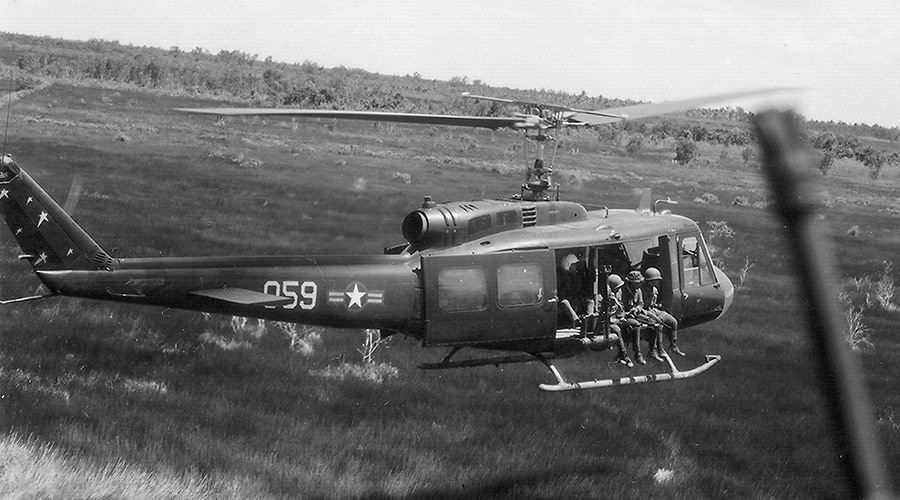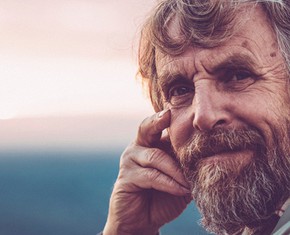The views expressed in our content reflect individual perspectives and do not represent the authoritative views of the Baha'i Faith.
He who has overcome his fears will truly be free. – Aristotle
Say to them that are of a fearful heart: be strong, fear not, behold your God. – 1 Isaiah 35:4.
Were men to discover the motivating purpose of God’s Revelation, they would assuredly cast away their fears, and, with hearts filled with gratitude, rejoice with exceeding gladness. – Baha’u’llah, Gleanings from the Writings of Baha’u’llah, p. 175.
Are you afraid of death?
“Sure,” you’re probably thinking. “Isn’t everyone?”
I had to answer both of those questions when I went to war. Every soldier does.
It didn’t take long to find an answer the second question. I learned, soon after my first active combat experiences, that some people actually have no fear of death. It’s rare, I’ll admit. I only saw it occasionally. But I did see it, and not always in that war-movie hero, Rambo cliché way, either. It didn’t typically occur when someone charged aggressively into enemy fire. We just considered those guys insane, or enormously irrational, or maybe chemically addled.
Instead, it usually happened when someone intentionally and consciously risked their own life to save the lives of others.
I witnessed it on both sides, among American and South Vietnamese soldiers and among the Viet Cong. At first it seemed incredibly foolhardy. Some people saw it as needlessly risky or even stupid, and described it as an aberration, a complete disregard for life, including your own. But I saw it differently.
I’ll never forgotten one incident: an American pilot I knew, who had his own family back home in Kansas, flew his helicopter into a hail of small-arms fire to save a Vietnamese family. I saw it happen. A mother and her three small children, walking through a field of rice paddies, had gotten caught in the crossfire between opposing forces. When the shooting began the little family ducked down behind an earthen berm, but that only provided protection from one side in the firefight. No one stopped shooting to let the mother and her kids pass unharmed. One of the children got hit by a bullet, and began to scream and cry. My platoon’s radioman heard those screams, and called for a Medevac, the medical evacuation helicopters that saved so many lives during that war.
My pilot friend must have been flying nearby, because he and his crew, a co-pilot and two medics, got there fast. From the air, he told me later, they could see exactly what was happening, and he decided that he had to land and evacuate the family, or they would surely be killed. As the fighting continued, my friend flew right into the hail of bullets from both sides. His helicopter took several rounds, but the engine and the rotors kept turning. He splashed down into a wet rice paddy, and one of the medics scooped up the family. The chopper rose into the sky.

They immediately flew to a field hospital. The helicopter barely made it, leaking fuel as it flew and eerily whistling as the air passed through all the bullet holes. None of the flight crew had a scratch, and neither did the mother or two of her children. The injured child recovered, but my friend the pilot never saw her or her family again. It all happened so fast that they didn’t even learn each other’s names.
Later I told my friend that I considered him a true hero, someone who risked his own life to save the lives of people he didn’t even know. He just shook his head, rejecting my characterization. Then he looked up at the heavens and said “Somebody was looking out for us.”
Which leads me to the point of my story. The soldiers and civilians I met during wartime who had conquered their fear of death all had one thing in common—they believed fully and fiercely in a life after this one:
In the treasuries of the knowledge of God there lieth concealed a knowledge which, when applied, will largely, though not wholly, eliminate fear. This knowledge, however, should be taught from childhood, as it will greatly aid in its elimination. Whatever decreaseth fear increaseth courage. – Baha’u’llah, Epistle to the Son of the Wolf, p. 32.
If you truly believe that this physical plane of existence doesn’t circumscribe, limit or define our lifespans, you can actually free yourself from the fear of death, and become truly courageous. When you lose that fear, you gain enormous boldness. Nothing scares you anymore. You begin to see yourself as eternal rather than limited; as permanent rather than temporary; as a soul rather than just a body.
Throughout human history, the wisest minds have always urged us to regard the soul as everlasting:
Death may be the greatest of all human blessings. – Socrates
The day which we fear as our last is but the birthday of eternity. – Seneca
Even death is not to be feared by one who has lived wisely. – Buddha
When it comes your time to die, be not like those whose hearts are filled with the fear of death, so that when their time comes they weep and pray for a little more time to live their lives over again in a different way. Sing your death song and die like a hero going home. – Chief Tecumseh
The goal of all life is death. – Freud
The first life, which pertaineth to the elemental body, will come to an end… But the second life, which ariseth from the knowledge of God, knoweth no death… – Baha’u’llah, Gems of Divine Mysteries, p. 38.
Next: How to Overcome the Denial of Death
















Comments
Sign in or create an account
Continue with Googleor